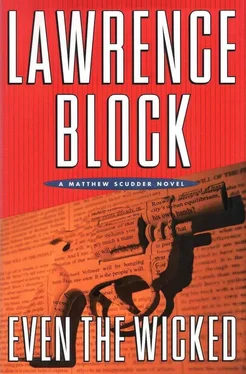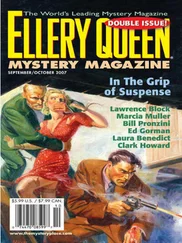The case against Richie did go to the jury, but there wasn’t much to it and his lawyer, Adrian Whitfield, was good enough to punch holes in it big enough for him to walk through. The judge’s charge was the nearest thing to an order of dismissal, and the jury took a scant hour and a half to come back with an acquittal.
“It was awful,” one juror told a reporter, “because we were all dead certain he did it, but the prosecution didn’t prove it. We had to find him not guilty, but there should have been a way to lock him up anyway. How can someone like that be released back into society?”
That’s what Marty McGraw wanted to know. “You may not be guilty in the eyes of the law,” he thundered, “but you’re as guilty as sin in my eyes, and the eyes of everybody I know, outside of twelve men and women forced by the system to be as blind as Justice herself...
“There are too many like you,” he went on, “falling through the cracks of the system and making the world a bad place to live. And I’ve got to tell you, I wish to God there were a way to get rid of you. Lynch law was a hell of a way to run things, and only a fool would want to go back to vigilante times. But you’re a powerful argument for it. We can’t touch you, and we’ve got to let you live among us like an ineradicable virus. You’re not going to change. You’re not going to get help, and guys like you are beyond help anyway. You nod and shuffle and con therapists and counselors and parole boards, and you slither out onto the streets of our cities and go back to preying on our kids.
“I’d kill you myself, but it’s not my style and I haven’t got the guts. Maybe you’ll step off the pavement and get hit by a bus. If you do, I’ll gladly kick in for the bus driver’s defense fund, if they’re crazy enough to charge him with anything. They ought to give him a medal — and I’d kick in for that, too, with pleasure.
“Or maybe, for once in your awful life, you’ll be a man and do the right thing. You could pick up a cue from Franny and put yourself out of everybody’s misery. I don’t suppose you’ve got the guts, either, but maybe you’ll summon up the courage, or maybe somebody’ll give you a hand. Because no matter what the nuns at St. Ignatius taught me, I can’t help it: I’d give a lot to see you with a rope around your neck, hanging from a tree limb, twisting slowly, slowly in the wind.”
It was classic McGraw, and very much the sort of thing that kept the tabloids hiring him away from one another at ever-higher salaries. His column was, as somebody had said, one of the things that made New York New York.
He’d tried his hand at other tasks over the years, and not without some success. He had published several books of nonfiction over the years, and while none had been a big seller they’d all been respectfully received. A couple of years back he’d hosted a talk program on a local cable channel, giving it up after a six-month run and a series of arguments with the station management. A while before that he’d written a play and actually had it produced on Broadway.
But it was with his column that he made his mark on the city. He had a way of articulating the anger and impatience of his readers, putting better words to it than they would have chosen yet sacrificing nothing in the way of plain-spoken blue-collar fury. I remember reading the column he wrote about Richie Vollmer, and I remember more or less agreeing with it. I didn’t much care for frontier justice, but there were times it seemed better than no justice at all. I’d hate to see a lynch mob marching down the street, but if they stopped in front of Richie Vollmer’s house I wouldn’t have run out there and tried to talk them out of it.
Not that I gave a lot of thought to the column. Like everybody else, I nodded from time to time in agreement, frowned now and then at this oversimplification or that infelicitous turn of phrase, thought to myself that it would not be a bad thing at all if Richie was found dangling from a limb or a lamppost. And, like everybody else, I turned the page.
Almost everybody else.
The column ran on Thursday, with the paper’s bulldog edition on the street late Wednesday night. In addition to eight or ten letters to the editor, two of which were later excerpted in “The Voice of the People,” five letters came in Friday and Saturday addressed to McGraw personally. One, from a Catholic layman in Riverdale, reminded McGraw that suicide was a mortal sin and urging another to commit such an act was sinful as well. The others all expressed agreement with the column, to one degree or another.
McGraw had a stack of printed postcards: “Dear _________, Thanks for taking the time to write. Whether you did or didn’t care for what I had to say, I’m grateful to you for writing, and pleased and proud to have you as a reader. I hope you’ll keep reading my stuff Tuesday, Thursday, and Sunday in the Daily News.” Not everyone who wrote would include a return address — some didn’t even sign their names — but those who did got postcards in reply, with their first names written in after “Dear” and a handwritten comment at the end — “Thanks!” or “You said it!” or “Good point!” He’d sign the cards and mail them off and forget the whole thing.
One of the five letters gave him a moment’s pause. “Your open letter to Richard Vollmer is sharply provocative,” it began. “What are we to do when the system fails? It is not enough to walk away, congratulating ourselves on our commitment to due process even as we wring our hands at the incident’s unfortunate outcome. Our criminal justice system requires a backup, a fail-safe device to correct those mistakes that are an inevitable outcome of a flawed system.
“When we send a rocket into space, we build it with components designed to back up other components which might fail. We allow for the possibility that some unforeseen factor will nudge it off course, and build in devices to correct any such deviations as occur. If we routinely take such precautions in outer space, can we do less on the streets of our cities?
“I submit that a backup system for our criminal justice system exists already in the hearts and souls of our citizens, if we have the will to activate it. And I believe we do. You are a manifestation of that collective will, writing the column you wrote. And I, too, am very much a manifestation of that will, the will of the people.
“Richard Vollmer will be hanging from that tree soon. It is the people’s will.”
The letter was more literate than most, and it was typed. McGraw’s readers were not all clowns and morons, scrawling their approval in crayon on brown paper bags, and he had received typed and well-phrased letters before, but they were invariably signed and almost always bore return addresses. This one was unsigned and there was no return address, not on the letter itself, not on the envelope it had come in, either. He made a point of checking, and the envelope bore his own name and the newspaper’s address. Nothing else.
He filed it and forgot about it.
The following weekend, two Dominican kids on mountain bikes came tearing down a steep path in Inwood Hill Park. One of them cried out to his friend, and they both braked to a stop as soon as they got to a spot that was level enough. “Joo see that?” “See what?” “On that tree.” “What tree?” “Was a guy hanging from that tree back there.” “You crazy, man. You seeing things, you crazy.” “We got to go back.” “Uphill? So we can see some guy hanging?” “Come on!”
They went back, and the boy had not been seeing things. A man was indeed hanging from the stout limb of a pin oak ten or fifteen yards off the bike path. They stopped their bikes and took a good look at him, and one of the kids promptly vomited. The hanging man was not a pretty sight. His head was the size of a basketball and his neck was a foot long, stretched by the weight of him. He wasn’t twisting slowly in the wind. There wasn’t any wind.
Читать дальше












